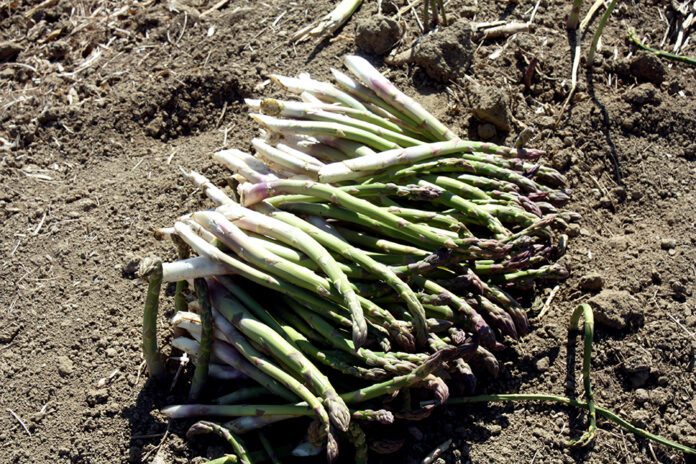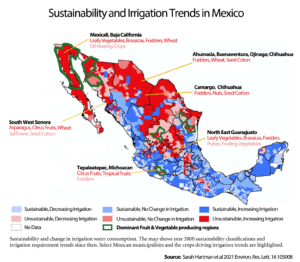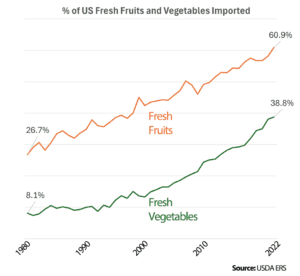
America’s grocery stores may seem brimming with fresh fruits and vegetables year-round, but behind the vibrant displays lies a sobering truth: A significant portion of these products are imported from other countries. According to data from USDA, a staggering 60.9% of the fresh fruit and 38.8% of the fresh vegetables consumed in the U.S. are sourced from abroad.
That’s a 228% increase of fruit and 479% increase of vegetable imports since 1980. This heavy reliance on imports poses a concerning risk to the security and sustainability of our food supply, particularly given the alarming challenges overseas producers face, including political strife, war, degrading natural resources and inconsistent food safety standards.
Mexico’s agricultural bounty has long been a boon for American consumers; however, the reliance on its produce comes with deeper concerns: unsustainable water supplies. Of total fruit and vegetable imports, Mexico now accounts for 69% of fresh vegetables and 51% of fresh fruits that make their way to the U.S.
Mexico is also one of the world’s largest exporters of tree nuts, with the water-stressed region of Chihuahua a major source of walnut production in the country. During the past 30 years, total tree nut production has grown significantly, with production increasing over 640% from 47,405 tons in 1992 to 304,747 tons in 2022. Walnuts alone have dominated the increase in tree nut production, growing from 2,900 tons in 1992 to more than 176,000 tons in 2022, according to USDA.
With an increasing demand for imported food products, attention is now turning to the long-term availability of those products. Large swaths of Mexican farmland, including regions around Mexicali and the Baja Peninsula, are irrigated with water supplies that are not sustainable, according to a 2021 report by Sarah Hartman in the “Environmental Resource Letter.”
The problem of water supply reliability is not merely a local issue confined to Mexican borders; it poses a looming threat to the entire U.S. food supply chain. As water sources dwindle and aquifers deplete, there are potential risks on the horizon of shortages of fresh fruits and vegetables. Left unchecked, this could lead to disrupted food supply chains and reduced availability of these essential food products as well as higher prices for consumers across the U.S.

The situation in Mexico serves as a stark reminder of the interconnectedness of global food systems and the urgent need for policies that support domestic food production. According to the Hartman report, some of the bigger problems associated with unsustainable water use in Mexico is environmental degradation, localized water insecurity, soil degradation, habitat loss and a threat to biodiversity.
Addressing this pressing issue requires a multifaceted approach that prioritizes food produced by California growers. Trade policies over the last 30 years and more recent domestic labor laws have caused significant damage to California growers and the workers who plant, till and harvest our crops. Legislation in California that changed overtime laws for farmworkers, which legislators claimed was intended to benefit them, had the opposite effect. When implemented, wage increases meant that California growers were less able to compete with their counterparts south of the border, causing labor-intensive crops, such as asparagus, to move out of the state, as reported by a recent article in the Los Angeles Times.

To protect America’s food supply, elected officials must consider the long-term effects of their actions. This means making more careful decisions about the policies and regulations that affect farmers who grow our food. More and more regulatory burdens in California often result in transporting problems to other parts of the world instead avoiding them here in the first place.
Local examples include things such as investing in water supply infrastructure and technology, more flexible permitting for capturing flood water to use for more groundwater recharge, eliminating regulatory oversight proposals to monitor activities that have yet to pose a problem and letting local water managers govern groundwater activities because a one-size-fits-all system doesn’t work.
Water legislation shouldn’t be based on a solution looking for a problem either. It should, when necessary, be aimed at keeping domestic farms producing the food we all depend on instead of relying on other countries where production practices don’t always measure up to California standards.
Consumers must also realize they have the power to drive change through their purchasing decisions. By supporting local farms that prioritize sustainability and choosing products with more localized supply chains, consumers can support food production in their own backyard.
The heavy reliance on imported fresh fruits and vegetables, particularly from Mexico, underscores the urgent need for lawmakers to reconsider policies that make farming in California uncompetitive. Failure to recognize the unsustainable water practices elsewhere in the world poses a significant risk to the future security and affordability of the U.S. food supply. It’s time for elected leaders at all levels to stand up for American growers and the consumers who depend on them and support a domestic, resilient and sustainable food system.















